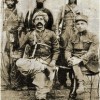Indian State Should Focus on Unconventional Methods: Jamal Nasir Baloch
The Baluch Resistance against Iran

By Johar Baluch
After the death of Sardar Hussain Khan in 1907 his son Sardar Sayyad Khan and the Barakzai chief, Mir Bahram khan try to spread their power in western Baluchistan, however, due to the military, the pressure of Persian army Sardar Sayyad Khan accepted Persian authority.
On the other hand, Mir Bahram Khan bravely stood his ground and faced the ruthless Persian army and he won the war. He became famous in the Baluch nation and established the Barakzai chiefdom in Iranian occupied Baluchistan.
The establishment of Barakzai chiefdom was short lived because in 1921 Mir Bahram Khan died. Hence, his nephew Mir Dost Muhammad Khan Barakzai became the Hakum (ruler) of the chiefdom. He strengthened and fortified his borders; Mir Dost Muhammad Barakzai also had maintained good relationships with the Khan of Kalat, the King of Afghanistan and the newly formed revolutionary government in Russia.
Mir Dost Muhammad Barakzai started a resistance against Persian armed force in Baluchistan. The Persians forces were under the command of Amanullah Jahanbani who started a bloody war the Baluch people and Persian invaders. The war continued for a year and thousands of Baluch were killed. The Persian forces also occupied the newly formed chiefdom of Barakzai in Bampur.
After the invasion of Bampur, the Persian armed force started massive operation against the Baluch nation and killed thousands of people. This military offensive of Persian forces had also weakened the hold of Mir Dost Muhammad Khan and eventually forced him to surrender before the ruthless authority of Persia and after one-year imprisonment, the Persian forces hanged him in Tehran.
The Raza Khan seized the Persian throne in 1925 and declared himself as the Shah of Persia. It was also him who changed the name of Persia to Iran – henceforth Reza Shah was known as Shah of Iran. As the new ruler of Persia, he also continued the ongoing bloodbath against Baluch people. First, he captured the Barakzai State and later occupied the entire Western part of Baluchistan – currently occupied by Iran.
Even after the occupation the Baluch the nation continued their struggle to break free from the clutched of Iran and regain their independence. The Baluch, then, embarked a national struggle and started resisting under the banner of Baluchistan Liberation Front (BLF) which inspired massed of people to join the freedom struggle.
During 1960 BLF received some support from the Baath Party of Saddam Hussain in Iraq. The Iraqi regime provided them with logistic and financial support and also trained the Baluch youth. Iraq supported the Baluch because they wanted to weaken Iran.
In retaliation, Iran also supported the Iraqi Kurdish resistance movement where Kurdish was demanding for freedom. Iraq authority opened a Radio in Baghdad propagated the issue of Baluchistan. Many Baluch Political leaders and tribal elites shifted to Bagdad they became directory to run the resistance movement of the western part of occupied Baluchistan.
The Founders of Baluchistan Liberation Front (BLF) included Mir Abdi Khan, Mir Moosa Khan and Akbar Barakzai and Mir Jamma khan. The BLF totally changed the western Baluchistan dynamically socially and politically and Baluch Liberation Front Aspired Nationalist concept and BLF ambushed Iranian invader army.
Iran and Pakistan were worried about the Baluch uprising in both frontiers. Occupier Pakistan and its crime partner Iran both thoughts that this resistance is to regain United Baluchistan. Hence, both fanatic regimes cooperated with each other in order to suppress the Baluch resistance movement in Eastern and Western occupied Baluchistan.
Meanwhile, invader Iran and Baluch killer Pakistan warned the USA and its allies “Independent Baluchistan” might provide the Soviet Union access to warm water. This propaganda was to malign the Baluch freedom struggle and incite western powers against Baluch people. At the same time, the Iranian secret agencies started target killing the exiled leaders and political workers. Many Baluch activists were murdered in Karachi and other areas.
However, the Baluchistan Liberation Front BLF continued its struggle for more than 10 years in the Western part of occupied Baluchistan. In the end, Iranian and Iraqi governments signed a treaty that curbs supporting each other’s proxies. Both countries agreed and Iraqi authority stopped supporting Baluch resistance. The Baluchistan liberation Front resistance movement was ended without getting its objective in western Baluchistan.
The Iran-Iraq deal should serve as a lesson. Iran and Pakistan are even closer and are already on the same page against Baluch people. All those Baluch whether intentionally or unintentionally are under this illusion that Iran will support them against Pakistan or Pakistan will support them against Iran must realise that nothing like this is going to happen. Iran and Pakistan may temporarily give some relief to some Baluch and use them as their hired proxies but the Persian and Punjabi can never be permanent friends of Baluch and Baluchistan.









